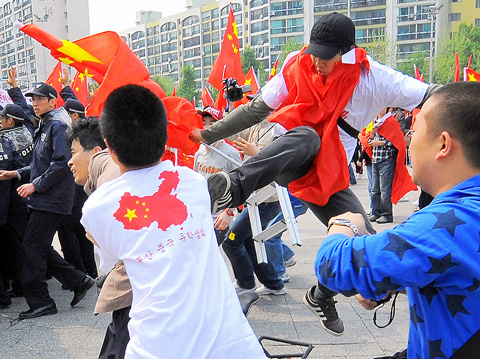A North Korean defector tried to set himself on fire to halt the Olympic torch relay yesterday in Seoul, where thousands of police guarded the flame from protesters blasting China’s treatment of North Korean refugees.
Hundreds of China supporters wearing red and waving the Chinese flag greeted the torch and threw rocks at demonstrators denouncing the torch run.
Police ran beside the flame and rode horses and bicycles with the relay across the city, which hosted the 1988 Olympics.

PHOTO: AFP
On other stops along the torch’s globe-trotting journey, it was China’s crackdown on violent protests against Chinese rule in Tibet that triggered attempts to disrupt the run celebrating the August games. But in South Korea, critics have focused on Beijing’s treatment of defectors who try to escape their lives of hardship in the North.
Thousands of North Koreans have fled across the loosely controlled Chinese border rather than the heavily fortified frontier to the South. Many defectors live in hiding in China, but if caught there, they are deported and likely face imprisonment in life-threatening conditions.
The man who tried to immolate himself, 45-year-old Son Jong-hoon, had led an unsuccessful public campaign to save his brother from execution in the North, where he was accused of spying after the two met secretly in China.
About an hour into the relay, Son poured gasoline on himself and tried to light himself, but police stopped him.
At the start of the relay, a protester rushed toward the Olympic flame and tried to unfurl a banner calling for China to respect the rights of North Korean refugees. Dozens of police surrounding the torch quickly whisked him away. Later as it approached the city center, another North Korean defector tried to impede the run and was arrested.
There were no further attempts to stop the torch on its 24km journey through Seoul to City Hall, where it was met by some 5,000 supporters.
Some 8,000 police were deployed across the South Korean capital to guard the torch.
Scuffles broke out near the relay’s start between a group of 500 Chinese supporters and about 50 demonstrators criticizing Beijing’s policies.
The students threw stones and water bottles as police tried to keep the two sides apart.
Meanwhile the Dalai Lama believes talks with China would be pointless unless Beijing is “serious” about finding a solution to the Tibetan issue, a spokesman for the spiritual leader said yesterday.
China’s Xinhua news agency announced on Friday that Beijing would meet an envoy of the Tibetan leader for talks in the coming days.
“We have had six rounds of talks but nothing happened and this time if China is serious then it is good, but if it wants to show the world that ‘we are talking’ then there is no use in meeting,” the spokesman, Tenzin Takla, said.
The warning came as Lodhi Gyari, a special envoy of the Tibetan spiritual leader, who has headed the previous rounds of inconclusive talks with China since 2002, was slated to arrive in India on Wednesday from the US for “consultations” with the exiled Tibetan leadership, Takla said.

The CIA has a message for Chinese government officials worried about their place in Chinese President Xi Jinping’s (習近平) government: Come work with us. The agency released two Mandarin-language videos on social media on Thursday inviting disgruntled officials to contact the CIA. The recruitment videos posted on YouTube and X racked up more than 5 million views combined in their first day. The outreach comes as CIA Director John Ratcliffe has vowed to boost the agency’s use of intelligence from human sources and its focus on China, which has recently targeted US officials with its own espionage operations. The videos are “aimed at

STEADFAST FRIEND: The bills encourage increased Taiwan-US engagement and address China’s distortion of UN Resolution 2758 to isolate Taiwan internationally The Presidential Office yesterday thanked the US House of Representatives for unanimously passing two Taiwan-related bills highlighting its solid support for Taiwan’s democracy and global participation, and for deepening bilateral relations. One of the bills, the Taiwan Assurance Implementation Act, requires the US Department of State to periodically review its guidelines for engagement with Taiwan, and report to the US Congress on the guidelines and plans to lift self-imposed limitations on US-Taiwan engagement. The other bill is the Taiwan International Solidarity Act, which clarifies that UN Resolution 2758 does not address the issue of the representation of Taiwan or its people in

US Indo-Pacific Commander Admiral Samuel Paparo on Friday expressed concern over the rate at which China is diversifying its military exercises, the Financial Times (FT) reported on Saturday. “The rates of change on the depth and breadth of their exercises is the one non-linear effect that I’ve seen in the last year that wakes me up at night or keeps me up at night,” Paparo was quoted by FT as saying while attending the annual Sedona Forum at the McCain Institute in Arizona. Paparo also expressed concern over the speed with which China was expanding its military. While the US

SHIFT: Taiwan’s better-than-expected first-quarter GDP and signs of weakness in the US have driven global capital back to emerging markets, the central bank head said The central bank yesterday blamed market speculation for the steep rise in the local currency, and urged exporters and financial institutions to stay calm and stop panic sell-offs to avoid hurting their own profitability. The nation’s top monetary policymaker said that it would step in, if necessary, to maintain order and stability in the foreign exchange market. The remarks came as the NT dollar yesterday closed up NT$0.919 to NT$30.145 against the US dollar in Taipei trading, after rising as high as NT$29.59 in intraday trading. The local currency has surged 5.85 percent against the greenback over the past two sessions, central